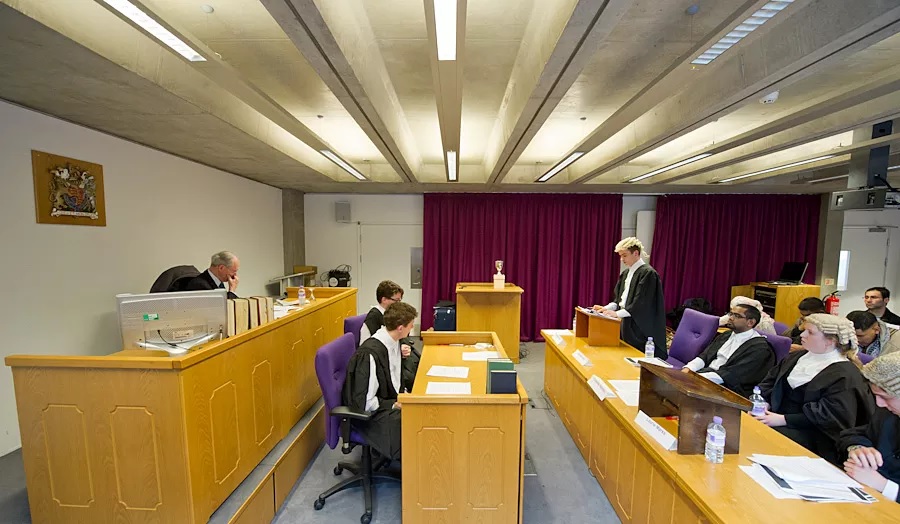Apply for this course
Please select when you would like to start:
If you're a UK applicant wanting to study full-time starting in September, you must apply via UCAS unless otherwise specified. If you're an international applicant wanting to study full-time, you can choose to apply via UCAS or directly to the University.
If you're applying for part-time study, you should apply directly to the University. If you require a Student visa, please be aware that you will not be able to study as a part-time student at undergraduate level.
If you're applying for a degree starting in January/February, you can apply directly to the University.
Apply to us for January 2025
If you're a UK student or an EU student with settled or pre-settled status applying for January 2025, you can simply call our hotline on 0800 032 4441 or complete our fast-track online application form.
Why study this course?
This undergraduate Law degree will help you develop excellent employability skills and prepare you for a wide range of careers. Taught by legal experts, you'll also benefit from extracurricular activities including presentations and events organised by the Mansfield Law Society and the Director of Clinical Legal Education. On graduation, you’ll have the knowledge and expertise you need for a career in politics, business, the voluntary sector, the civil service or as a paralegal, patent lawyer or licensed conveyancer.
Our law courses are ranked ninth in the UK for teaching quality in the Guardian University Guide 2023.
Top seven in the country for satisfaction with teaching
Our law courses were ranked in the top seven in the UK for satisfaction with teaching, according to the Guardian University Guide 2024
Third in London for student satisfaction
Our law courses are ranked third in London for overall student satisfaction in the Complete University Guide 2025
Benefit from extracurricular activities
You'll be able to attend many activities including presentations and events organised by the Mansfield Law Society and the Director of Clinical Legal Education
Course modules
The modules listed below are for the academic year 2024/25 and represent the course modules at this time. Modules and module details (including, but not limited to, location and time) are subject to change over time.
Year* 1 modules
Year 2 modules
Year 3 modules
Administrative Law
This module currently runs:autumn semester - Friday morning
(core, 15 credits)
Administrative Law provides a contextual introduction to some of the central areas of UK Public Law. It provides a detailed examination of the principles of administrative law with particular emphasis on the procedure and substantive grounds for judicial review in English law.
The aims of this module are to provide students with a working knowledge and
understanding of administrative law, and to develop several key transferable skills in this
context, including:
1. A critical understanding of the extent and efficiency of control on governmental
bodies;
2. An ability to apply legal principles to theoretical examples in order to draw
conclusions and give advice to the citizen;
3. To engage in independent research, analysis and academic writing, using both primary and secondary sources of law.
Constitutional Law
This module currently runs:spring semester - Wednesday morning
(core, 15 credits)
Constitutional Law provides a contextual introduction to some of the central areas of UK Public Law. It provides a detailed examination of the principles of constitutional law with particular emphasis on constitutional principles; the rule of law; the sovereignty of Parliament; human rights; and the UK state.
The aims of this module are to provide students with a working knowledge and
understanding of constitutional law, and to develop several key transferable skills in this
context, including:
1. An understanding of the extent and efficiency of control on governmental
bodies;
2. An ability to apply legal principles to theoretical examples in order to draw
conclusions and give advice to the citizen;
3. To engage in independent research, basic analysis and academic writing, using both primary and secondary sources of law.
Read full detailsContract I
This module currently runs:autumn semester - Wednesday morning
(core, 15 credits)
The Law of Contract I is a core module for the LL.B. courses and the BA in Law, which introduces students to the key principles of the Law of Contract, which is one of the foundation subjects of English Law, as identified by the professional legal bodies, the Solicitors Regulation Authority and the Bar Standards Board.
Students will study the principles of contractual formation and contents, including offer, acceptance, consideration, third party rights, terms and exemption clauses.
The aims of the module are as follows:
1. Students will acquire knowledge of the basic precepts of contractual formation and construction;
2. Students will develop their skills in finding, reading and understanding primary sources of law;
3. Students will develop their skills in finding, reading and understanding secondary sources of law;
4. Students will practise the practical and professional skills of legal research, legal analysis and legal writing.
Read full detailsCriminal Law I
This module currently runs:spring semester - Friday morning
(core, 15 credits)
Criminal Law I is a core module for the LL.B. courses and the BA in Law, which introduces students to the key principles of Criminal Law, one of the foundation subjects of English Law, as identified by the professional legal bodies, the Solicitors Regulation Authority and the Bar Standards Board.
The module provides an academic introduction to the fundamental rules of criminal law, including the key principles of a number of criminal offences involving homicide. Criminal law affects many aspects of human behaviour and interaction but has complex definitions.
The aims of this module are as follows:
1. To help students to understand the changing landscape of criminal law as well as some of the major debates in the subject.
2. To teach and assess key skills of analysis, academic writing and legal research in the context of criminal law. It does this by emphasising the use of primary and secondary sources of criminal law, including court judgments, Acts of Parliament, Parliamentary Papers and academic journal articles.
Read full detailsEnglish Legal System
This module currently runs:autumn semester - Tuesday morning
(core, 15 credits)
English Legal System is a core module for the LL.B. courses and the BA in Law, which introduces students to the workings of the English Legal System in its historical, contemporary and international context.
It includes the study of the sources of law; the law-making process; the institutional and court structure; and basic issues of procedure within the English Legal system.
It also enables students to start to acquire the fundamental academic and professional skills necessary for the undergraduate study of law. In this way, it provides a solid support both for the other Level 4 modules, and also for the remainder of the degree course and beyond into professional practice.
The aims of the module are to introduce the following to students:
1. Reflective thinking in the context of contemporary legal issues.
2. A working knowledge of legal language, sources of English law and legal procedure;
3. How to locate legal material;
4. How to read and understand primary and secondary sources of law (paper based and electronic);
5. How to recognise and develop at an introductory level the practical and professional legal skills of advocacy, legal research and legal writing.
Read full detailsLand Law I
This module currently runs:autumn semester - Thursday morning
(core, 15 credits)
Land Law I is a core module for the LL.B. courses, which introduces students to the key principles of the law relating to real property, one of the foundation subjects of English Law, as identified by the professional legal bodies, the Solicitors Regulation Authority and the Bar Standards Board.
It introduces and builds up a critical understanding of the legal concepts regarding the ownership and co-ownership of land in England and Wales and the control of assets. Students study the system of registered and unregistered land; the rules relating to the transfer of title; and the controls on land use.
Leases, licences, mortgages, easements, restrictive freehold covenants, adverse possession, conveyancing, human rights and torts relating to property will likewise be explained and analysed.
The module aims are as follows:
1. To develop several key transferable skills including independent research, basic analysis and academic writing in the context of land law, emphasising the use of primary and secondary sources of land law;
2. To enhance student employability by the development both of these skills, and by
the practice of written (including summative) and oral communication skills (formative) activities.
Law of Tort I
This module currently runs:spring semester - Thursday morning
(core, 15 credits)
The Law of Tort I is a core module for the LL.B. courses and the BA in Law, which introduces students to some of the key principles of the Law of Tort, which is one of the foundation subjects of English Law, as identified by the professional legal bodies, the Solicitors Regulation Authority and the Bar Standards Board.
Students will study the principles of the tort of negligence, by far the most significant of the torts in terms of legal practice. These principles include the duty of care, breach of duty, causation and remoteness.
The aims of the module are as follows:
1. Students will acquire knowledge of the basic precepts of the tort of negligence;
2. Students will develop their skills in finding, reading and understanding primary sources of law;
3. Students will develop their skills in finding, reading and understanding secondary sources of law;
4. Students will practise the practical and professional skills of legal research, legal analysis and legal writing.
Read full detailsLegal Method
This module currently runs:spring semester - Tuesday morning
(core, 15 credits)
Legal Method is a core module for the LL.B. courses and the BA in Law, which introduces students to methods of legal research, analysis and logic; to a practical knowledge of the legal profession and careers; and to issues of judicial ethics.
Students learn about legal method, in particular about legal practice, legal scholarship and legal research methods. They also explore issues around legal reasoning and analysis. These skills are be applied in the context of primary legal materials used in their other modules.
The aims of the module are as follows:
1. To introduce students to reflective thinking in the context of contemporary issues of legal method.
2. To enable students to continue to acquire the fundamental academic and professional skills necessary for the undergraduate study of law;
3. To provide a solid support both for the other Level 4 modules, and also for the remainder of the degree course and beyond into professional practice;
4. To begin to develop employability skills specific to work within the legal sector and related professions.
Read full detailsContract Law II
This module currently runs:autumn semester - Monday morning
(core, 15 credits)
The Law of Contract II is a core module for the LL.B. courses and the B.A. Law, which builds on the knowledge and skills acquired in the study of the LL4050, the Law of Contract I. Students study further key principles of the law of contract, which is one of the foundation subjects of English law, as identified by the professional legal bodies, the Solicitors Regulation Authority and the Bar Standards Board.
The aims of the module are as follows:
1. Students will acquire knowledge of the basic principles of the vitiating factors which might affect the validity and/or enforceability of a contract; and the remedies available for breach of contract.
2. Students will develop several key transferable skills, including independent research, critical analysis and cogent academic writing in the context of contract law, emphasising the use of primary and secondary sources.
3. Students will enhance their employability by the development both of these skills, and by the practice of written communication activities (including summative) and oral communication activities (formative only).
Read full detailsCriminal Law II
This module currently runs:autumn semester - Tuesday afternoon
(core, 15 credits)
Criminal Law II is a core module for the LL.B. courses and the B.A. Law, which builds on the knowledge and skills acquired in the study of the LL4057, Criminal Law I. Students study further key principles of criminal law, which is one of the foundation subjects of English law, as identified by the professional legal bodies, the Solicitors Regulation Authority and the Bar Standards Board.
The aims of the module are as follows:
1. Students will acquire knowledge of the basic principles of defences; violent offences; and property offences in criminal law.
2. Students will develop several key transferable skills, including independent research, critical analysis and cogent academic writing in the context of criminal law, emphasising the use of primary and secondary sources.
3. Students will enhance their employability by the development both of these skills, and by the practice of written communication activities (including summative) and oral communication activities (formative only).
Read full detailsLaw of Tort II
This module currently runs:autumn semester - Thursday morning
(core, 15 credits)
Law of Tort II is a core module for the LL.B. courses and the B.A. Law. It builds on the knowledge and skills acquired in the study of the LL4054, Law of Tort I. Students study further key principles of the law of tort, which is one of the foundation subjects of English law, as identified by the professional legal bodies, the Solicitors Regulation Authority and the Bar Standards Board.
The aims of the module are as follows:
1. Students will acquire knowledge of the basic principles of the torts of private nuisance; occupiers’ liability; trespass; defamation; and passing off.
2. Students will develop several key transferable skills, including independent research, critical analysis and cogent academic writing in the context of the law of tort, emphasising the use of primary and secondary sources.
3. Students will enhance their employability by the development both of these skills, and by the practice of written communication activities (including summative) and oral communication activities (formative only).
Read full detailsConsumer Rights Law
This module currently runs:spring semester - Tuesday morning
autumn semester - Tuesday morning
(option, 15 credits)
Consumer Rights Law is a 15-credit module providing students with a thorough understanding of modern consumer rights in relation to the acquisition of goods and services. As well as studying the traditional requirements of a sale of goods contract, students will also examine the law on statutory liability for dangerous and defective products, the law regarding the unfair trading practices and the principles and responsibility for regulation of the consumer market.
The module will be of interest to all students who wish to develop a comprehensive understanding of modern consumer rights and responsibilities in relation to goods, services and digital content. The module is relevant to a range of careers in law, retailing and consumer advice and marketing of goods and services.
There will be a formative in-class assessment which will test the students’ basic understanding of key legal principles and concepts. This will be designed to ensure that their knowledge is adequate for the summative assessments to follow.
The aims of the module are as follows:
1. To provide detailed, critical and evaluative knowledge of laws which regulate modern commerce.
2. To enable students to appreciate the regulation of the consumer market.
3. To create an awareness of consumer advice roles.
Read full detailsEmployment Law
This module currently runs:autumn semester - Monday afternoon
(option, 15 credits)
Employment and Equality Law will focus on the legal relationship between employers and workers as well as the law relating to the prohibition of discrimination both within and outside the employment context. The module examines the diverse nature of individual employment relationships, the content of the contract of employment and the remedies available to the parties on its termination. It outlines the domestic statutory and common law provisions which govern the employment relationship between employers and employees and employers and workers.
The aims of the module are as follows:
1. Students will be given opportunities for critical examination of domestic statute and case law related to the prohibition of discrimination.
2. Students will develop their practical knowledge of employment and equality law through independent research and application to hypothetical problem questions.
3. Students will develop a critical understanding of employment and equality law through analysis of the social and economic context in which the law has developed.
4. Students will develop their oral presentation skills in a supportive atmosphere in seminars.
5. Students will develop their professional skills through observation of tribunal proceedings.
Read full detailsLand Law II
This module currently runs:spring semester - Monday afternoon
(option, 15 credits)
Land Law II is a core module for the LL.B. courses and the B.A. Law, which builds on the knowledge and skills acquired in the study of the LL4052, Land Law I. Students study further key principles of land law, which is one of the foundation subjects of English law, as identified by the professional legal bodies, the Solicitors Regulation Authority and the Bar Standards Board.
The aims of the module are as follows:
1. Students will acquire knowledge of the basic principles of leases; the family home; and controls of land use in private law.
2. Students will develop several key transferable skills, including independent research, critical analysis and cogent academic writing in the context of land law, emphasising the use of primary and secondary sources.
3. Students will enhance their employability by the development both of these skills, and by the practice of written communication activities (including summative) and oral communication activities (formative only).
Read full detailsLaw of Evidence
This module currently runs:autumn semester - Friday morning
(option, 15 credits)
The Law of Evidence is a core module for the LL.B. Criminal Law (Hons). It is an optional module for the other LL.B. courses; the B.A. Criminology and Law;
and the B.A. in Law.
The Law of Evidence concerns the information which it is permitted to use to enable the claimant or prosecution to establish their case against a defendant, or to enable the defendant to refute the allegations made against him.
It is not every supposed fact that may be brought in evidence in a trial, as the court has limited time and resources to hear everything – however trivial – that the parties might wish to throw into the debate, and there are a host of issues relating to such matters as unfairness or undue prejudice (especially to the defendant in a criminal case), mistakes, unreliability of witnesses, human rights and public policy which might impact on the propriety of permitting certain statements or documents to be admitted as evidence.
This module examines the rules and ethics of the law of evidence, which have arisen both at common law and under statute, and invites to students critically to analyse these principles both in a theoretical context, and by practical application to realistic case-studies.
The aims of the module are as follows:
1. Students will acquire knowledge of the rules and ethics of the law of evidence, which have arisen both at common law and under statute.
2. Students will develop several key transferable skills, including independent research, critical analysis and cogent academic writing in the context of land law, emphasising the use of primary and secondary sources;
3. Students will enhance their employability by the development both of these skills, and by the practice of written communication activities (including summative) and oral communication activities (formative only).
Read full detailsLaw of the European Union I
This module currently runs:spring semester - Friday afternoon
(option, 15 credits)
Law of the European Union I is a core LL.B. module which provides a detailed understanding of the underlying concepts of European Union Law and its topical relationship to domestic law of Member States.
It considers the law-making powers of the EU institutions; the constitutional principles of the EU; the direct effect of EU law; indirect effect and the principle of State Liability; and the key role of the Court of Justice of the European Union (CJEU) in relation to preliminary references from domestic courts, enforcement actions against Member States, judicial review of EU law and its development of human rights.
The module provides a sound understanding of the key features of the EU legal order, its main institutions, the law-making processes and the legal control of administrative powers in the EU and within EU Member States.
It will provide a sound understanding of the relationship between history, politics, law and economics in the development of the EU.
The aims of the module are as follows:
1. Students will acquire knowledge of the institutions of the European Union; the constitutional principles of the EU; the direct and indirect effect of EU law; principle of State Liability; and the key role of the Court of Justice of the European Union.
2. Students will develop several key transferable skills, including independent research, critical analysis and cogent academic writing in the context of EU law, emphasising the use of primary and secondary sources.
3. Students will enhance their employability by the development both of these skills, and by the practice of written communication activities (including summative) and oral communication activities (formative only).
Read full detailsLegal Research Methods
This module currently runs:spring semester - Thursday afternoon
autumn semester - Thursday afternoon
(option, 15 credits)
Legal Research Methods, which is offered in both the autumn and spring semesters, provides a detailed understanding of how to prepare for writing a dissertation or thesis on a legal topic.
Students will be given practical guidance on how to conduct advanced legal research from both primary and secondary sources; how to choose a viable research topic; how to write a research proposal; how to conduct a literature review; and how to choose the right methods and methodology for the dissertation.
In doing this, the students will be preparing themselves for conducting legal research in both an academic and professional field, as well as for writing a research dissertation at Level 6.
The aims of the module are as follows:
1. Students will acquire advanced knowledge of how to conduct independent legal research and how to organise, assemble and synthesise large amounts of legal material in order to identify legal problems.
2. Students will develop several key transferable skills, including independent research, critical analysis and cogent academic writing in the context of writing a research dissertation, emphasising the use of primary and secondary sources.
3. Students will enhance their employability by the development both of these skills, and by the practice of written communication activities (including summative) and oral communication activities (formative only).
Read full detailsCivil Law and Practice
This module currently runs:spring semester - Thursday afternoon
autumn semester - Thursday afternoon
(core, 15 credits)
Civil Law and Practice provides students with an understanding of civil law in a legal practice context. The course introduces students to the civil law process, including the civil court system; alternative dispute resolution; the Civil Procedure Rules; and strategic issues related to settling civil disputes. The module also introduces students to professional conduct rules in a legal practice context.
The module aims to develop several key transferable skills including independent research, critical analysis and written and oral presentation skills in the context of a practical legal subject. It also aims to give students an insight into the practical aspects of law which is particularly valuable if they are contemplating a career in legal practice.
Student employability will be enhanced by the development both of these skills and also by the experiential learning involved in the practical exercises and the pro bono work which is integral both to the study and assessment of this module. The knowledge and skills gained on this module will also assist students who wish to go on to the admission courses set by the professional legal bodies, such as the Solicitors Regulation Authority and the Bar Standards Board.
Read full detailsCriminal Litigation
This module currently runs:spring semester - Friday morning
(core, 15 credits)
Criminal Litigation provides students with an understanding of criminal litigation in a legal practice context. The course introduces students to the criminal litigation process, including the role and powers of the police in relation to stop and search and arrest, the role of the CPS in charging and prosecuting an offender and the structure and jurisdiction of the criminal courts. The module also introduces students to professional conduct rules in a legal practice context.
The module aims to develop several key transferable skills including independent research, critical analysis and written and oral presentation skills in the context of a practical legal subject. It also aims to give students an insight into the practical aspects of law which is particularly valuable if they are contemplating a career in legal practice.
Student employability will be enhanced by the development both of these skills and also by gaining expertise in answering situational judgment, multiple-choice questions, such as are typical in professional legal assessments such as the Solicitors Qualifying Examination and some Bar Practice courses.
Read full detailsLaw Dissertation
This module currently runs:all year (September start) - Monday morning
(alternative core, 30 credits)
The Law Dissertation module builds on the Legal Research Methods module at Level 5. It requires the students to undertake detailed, critical research into a law topic of their choice and write an essay of up to 8,000 words.
Students are assigned a supervisor based on their choice of topic.
The module is structured so that students are required to present a formative research plan, which then provides the infrastructure for their dissertation. Students are expected to engage with regular supervision throughout the process.
Students will develop an advanced understanding of their chosen specialist area of law.
The aims of the module are to:
• allow students independently to research and develop an expert understanding of an area of law of their choice;
• improve both the research and independent study skills of the students;
• enhance the ability of students to develop critical arguments
By researching their chosen area of law, students will be equipped with specialist skills and knowledge, to help them stand out in the job market.
Law Research Essay
This module currently runs:autumn semester - Monday morning
spring semester - Monday morning
(alternative core, 15 credits)
The Law Research Essay module requires the students to undertake detailed, critical research into a law topic of their choice and to write a research proposal (500 words) and a research-based essay (1,500 words).
Students are assigned a supervisor based on their choice of topic.
The module is structured so that students are required to present an assessed research plan, which then provides the infrastructure for their extended essay. Students are expected to engage with regular supervision throughout the process.
Students will develop an advanced understanding of their chosen specialist area of law.
The aims of the module are to:
• allow students independently to research and develop an expert understanding of an area of law of their choice;
• improve both the research and independent study skills of the students;
• enhance the ability of students to develop critical arguments
By researching their chosen area of law, students will be equipped with specialist skills and knowledge, to help them stand out in the job market.
Child Law
This module currently runs:autumn semester - Monday afternoon
(option, 15 credits)
Child Law aims to provide students with knowledge and a critical perspective of the legal principles relating to Child Law, especially in the context of recent and proposed reforms.
The topics covered are the role and involvement of local authorities, and private law issues, such as disputes about paternity, relocation, contact orders and assisted reproduction.
The aims of the module are as follows:
1. Students will acquire knowledge of the rules and ethics of child law which have arisen both at common law and under statute.
2. Students will develop several key transferable skills, including independent research, critical analysis and cogent academic writing in the context of child law, emphasising the use of primary and secondary sources;
3. Students will enhance their employability by the development both of these skills, and by the practice of written communication activities (including summative) and oral communication activities (formative only).
Read full detailsCivil Liberties and Human Rights
This module currently runs:autumn semester - Tuesday morning
(option, 15 credits)
Civil Liberties and Human Rights gives a clear, coherent and up to date account of the law of human rights and civil liberties, concentrating on the position of civil liberties and human rights protection in the light of the Human Rights Act 1998 and the standards of human rights protection laid down in the European Convention on Human Rights
It introduces and builds up critical understanding of the legal concepts which govern individual and collective rights and responsibilities, including the constraints the state may place on the citizen’s exercise of his or her human rights.
The module aims to develop several key transferable skills including independent research, critical analysis, legal drafting and academic writing in the context of the law of civil liberties and human rights, emphasising the use of primary and secondary sources of law. It will encourage and enable students to develop a sophisticated understanding of the relationship that exists - in terms of specific individual rights and freedoms - between the State and the citizen in the UK today and how the legal, social and political conflicts and tensions which are intrinsic to that relationship influence policy, decision-making and legislation.
Student employability will be enhanced by the development both of these skills and by
the practising of written and oral communication skills and group participation skills.
Company Law
This module currently runs:autumn semester - Thursday morning
(option, 15 credits)
Company Law includes the study of the formation, constitution and management of companies, together with share issue, share capital, loan capital and selected aspects of insolvency law.
Students will also examine – and look behind – the corporate veil, making a critical evaluation of the rules of corporate governance.
The module aims to develop several key transferable skills including independent
research, critical analysis and academic writing in the context of company law, emphasising the use of primary and secondary sources of law.
It is a vital and dynamic topic for anyone interested in working in the corporate sector, and anyone who needs to know how businesses operate.
The aims of the module are as follows:
1. Students will acquire knowledge of the rules and regulations of company law, which have arisen both at common law and under statute.
2. Students will develop several key transferable skills, including independent research, critical analysis and cogent academic writing in the context of company law, emphasising the use of primary and secondary sources;
3. Students will enhance their employability by the development both of these skills, and by the practice of written communication activities (including summative) and oral communication activities (formative only).
Read full detailsEntertainment Law
This module currently runs:spring semester - Wednesday morning
(option, 15 credits)
Entertainment Law explores how key areas of the entertainment industries operate, and evaluates the impact of the law upon them. This module provides the key skills necessary to understand the legal concepts, cases and contracts underpinning a career in entertainment law.
Module aims:
1. To provide an understanding of the core concepts of copyright and certain related intellectual property rights
2. To provide an understanding of key contracts and concepts shaping the Entertainment industry
3. To provide students with an opportunity for analysis and application of the law to factual circumstances which occur in the entertainment industries
4. To understand the business obligations and expectations created by various forms of contractual relations within the sector
5. To develop a student’s ability to undertake study and research both individually and as part of a group
6. To develop a student’s ability to use a range of legal sources applicable to Entertainment Law
Environmental Law
This module currently runs:autumn semester - Tuesday morning
(option, 15 credits)
Environmental Law covers a wide range of concepts. It includes a consideration of the protection of natural resources through the traditional aspects of law but also through a range of principles and policy considerations.
Increasingly, the effectiveness of environmental protection requires a consideration of the impact of business, not only as part of the problem of environmental degradation, but also as part of the solution to the future protection of exhaustible natural resources.
Students will be able to explore a range of selected contemporary environmental issues including climate change and renewable energy. Issues of sustainable development are underpinned by aspects of environmental justice and will be considered from domestic and global perspectives.
Overall, the module will aim to contextualise environmental law within the wider constructs of socio-economic and ethical considerations.
This module aims to facilitate a critical approach to an understanding of environmental regulation and the policy through the exploration of contemporary issues at all levels of law and policy making (including the domestic, European and international).
There are many career opportunities within the environmental field including work as an environmental lawyer (public or private practice), public policy advisor, working within government agencies e.g. DEFRA or the Environmental Agency or for NGO’s such as Friends of the Earth.
Family Law
This module currently runs:spring semester - Monday afternoon
(option, 15 credits)
Family Law aims to provide students with knowledge and understanding of key legal rules and principles of family law and develop in students a critical perspective of contemporary issues and proposed law reforms.
The topics covered are: nullity of marriage, ending marriage by divorce, financial remedies on divorce, protection through the courts against from domestic violence, and comparison of legal remedies of married couples and cohabiting couples. [Civil partnership and dissolution of partnership will be referred to in outline only.]
The aims of the module are:
1. To facilitate students’ acquisition of a sound knowledge and understanding of some of the key rules and principles of family law and their development through statute and case law.
2. To promote the development of students’ transferable skills of legal problem solving, independent legal research using primary and secondary sources, critical analysis of contemporary issues, and cogent academic writing in the context of family law.
3. To enhance students’ employability by the development of these skills and by the practice of both oral and written communication throughout the module.
Read full detailsInternational Trade Law
This module currently runs:spring semester - Wednesday afternoon
(option, 15 credits)
International Trade Law concerns shipping and cross-border trade, which are interrelated in both pragmatic and legal terms.
This module enables students to obtain a deep understanding of the context and characteristics of international sale contracts concluded on shipment terms. Students will learn about the importance of English law in international trade. They will also be able to distinguish between the physical and documentary duties of the trade protagonists under a sale contract, understand the cardinal role of the bill of lading in shipping and commerce and the importance of the proper drafting of the sale and carriage contracts respectively.
The aim of this module is to enable students to identify, decipher and debate relevant legal issues arising from international commercial law disputes. They will have the expertise to scrutinise sale contracts on shipment terms and advise the buyer and seller as to their respective rights and liabilities, with reference to English law.
It will be of particular interest to students taking the LLB (Commercial Law) but also to any student considering a career in commercial law in general.
Read full detailsJurisprudence
This module currently runs:spring semester - Monday morning
(option, 15 credits)
Jurisprudence provides an introduction to legal theory, covering basic theoretical and ethical perspectives on the law. Students will receive a sound understanding of the theories of different jurisprudential schools of thought and the contributions made to legal thinking by leading jurists from the Ancient Greeks to contemporary thinkers. The aim is to provide students with background knowledge of the science or philosophy of law. Students will learn how jurisprudence has contributed to the development of modern political, economic and legal systems. In addition, the course is placed in a modern setting and aims to raise contemporary ethical debates in order to raise awareness of the ethical background against which the law and legal practice needs to be understood.
The study of jurisprudence permits a fuller understanding of the rational and ethical values that underpin the law and systems of justice.
The aims of this module include:
1. To provide students with an understanding of legal ideologies which have contributed to the development of legal, political and socio-economic systems in the world.
2. To explore philosophical questions relevant to legal systems, particularly concerning the relationship between law and morality.
3. To encourage students to recognize the ethical issues inherent in legal thinking and practice and to examine and articulate their own arguments in respect of such issues.
4. To develop the students’ powers of reasoning and critical thinking and to increase their awareness of the relevance of theoretical issues to practical problems.
5. To enable students to increase their capacity to work in teams cooperatively and effectively through participation in topical debates and to take initiative and responsibility in the context of such group work, so increasing competence in discussion and oral presentation.
6. To develop further students’ ability to organise and synthesise large amounts of information in order to present key issues at an early stage in their research.
Read full detailsLandlord and Tenant Law
This module currently runs:autumn semester - Thursday afternoon
(option, 15 credits)
Landlord and Tenant Law builds on the knowledge that students would have gained from the study of land law. The course will examine the development of the common law, legislation and case law and will provide the student with the academic knowledge and practical know how required.
The course will enable students to appreciate both the law and procedures involve in this area of law, as well as to understand and critique the cultural, social and political context which applies to housing law.
Knowledge of the topics covered will enhance students’ employability both within the legal profession and more generally in a range of commercial activity. This subject is regarded as one of the main areas of practice of solicitors and barristers. Students who do not wish to qualify as lawyers have in the past found it equally useful in assisting them to gain employment in advice work at Citizens Advice and Law Centres. Some have managed to take advantage of opportunities in local authorities and housing associations.
Read full detailsLaw of Evidence
This module currently runs:autumn semester - Friday morning
(option, 15 credits)
The Law of Evidence is a core module for the LL.B. Criminal Law (Hons). It is an optional module for the other LL.B. courses; the B.A. Criminology and Law;
and the B.A. in Law.
The Law of Evidence concerns the information which it is permitted to use to enable the claimant or prosecution to establish their case against a defendant, or to enable the defendant to refute the allegations made against him.
It is not every supposed fact that may be brought in evidence in a trial, as the court has limited time and resources to hear everything – however trivial – that the parties might wish to throw into the debate, and there are a host of issues relating to such matters as unfairness or undue prejudice (especially to the defendant in a criminal case), mistakes, unreliability of witnesses, human rights and public policy which might impact on the propriety of permitting certain statements or documents to be admitted as evidence.
This module examines the rules and ethics of the law of evidence, which have arisen both at common law and under statute, and invites to students critically to analyse these principles both in a theoretical context, and by practical application to realistic case-studies.
The aims of the module are as follows:
1. Students will acquire knowledge of the rules and ethics of the law of evidence, which have arisen both at common law and under statute.
2. Students will develop several key transferable skills, including independent research, critical analysis and cogent academic writing in the context of land law, emphasising the use of primary and secondary sources;
3. Students will enhance their employability by the development both of these skills, and by the practice of written communication activities (including summative) and oral communication activities (formative only).
Read full detailsLaw of Immigration and Asylum
This module currently runs:autumn semester - Wednesday morning
(option, 15 credits)
The Law of Immigration and Asylum provides students with an understanding of the legal concepts of immigration and nationality. This will involve a study of the rules relating to temporary admissions, settlement, deportation, illegal entry, removal and asylum.
Students will gain a critical appreciation of the rules, policies, Conventions and cases which are integral to this field of law, and become aware of the variety of applications that may be made in the tribunals, both through independent research and by visits to the relevant tribunals. They will also develop an understanding of the ethical implications arising out of UK Immigration policy as evidenced in the most recent case law and legislation.
The module aims to develop several key transferable skills including independent research, critical analysis, legal drafting and academic writing in the context of the law of immigration and asylum, emphasising the use of primary and secondary sources of law. The preparation and delivery of the assessed group oral presentation will also develop communication and team-working skills.
Student employability will be enhanced by the development both of these skills, and by
the practise of written and oral communication skills and group participation skills.
Law of the European Union II
This module currently runs:spring semester - Tuesday afternoon
(option, 15 credits)
This core LLB module builds on the knowledge gained in the Law of the European Union I, to provide a detailed understanding of the underlying concepts of European Union Law and its topical relationship to UK domestic law.
It considers EU citizenship; the rights of EU workers; free movement of goods; and competition law.
The module provides a sound understanding of the key features of the EU legal order, its main institutions, the law-making processes and the legal control of administrative powers in the EU and the UK.
It will provide a sound understanding of the relationship between history, politics, law and economics in the development of the EU.
The aims of the module are to give students an appreciation of the theoretical and foundational aspects of EU law as it applies in the UK. The module facilitates a contextual and critical appreciation of the law and politics relating to the administration and governance of the UK State in a period of radical constitutional change (‘Brexit’).
It will provide a sound understanding of the relationship between history, politics, law and economics in the development of the EU.
The module aims to develop several key transferable skills including independent research, critical analysis and academic writing in the context of the Law of the European Union, emphasising the use of primary and secondary sources of law.
Read full detailsPenal Policy
This module currently runs:spring semester - Thursday afternoon
(option, 15 credits)
This module provides an introduction to theories of punishment from a criminological and sociological standpoint. It also deals with aspects of sentencing practice and procedure and allows students to participate in sentencing simulation exercises and debates. Certain categories of offender (e.g. young offenders, women) are considered in depth. Finally, the issue of penal reform, including restorative justice, is addressed in the light of the most recent initiatives in the field.
The course includes:
• an introduction to theories of punishment and their historical roots with an emphasis upon critical discussion of the conceptual positions that underscore the system.
• an introduction to the range of sentencing options available to the courts and an awareness of the considerations that confront sentencers in making sentencing decisions.
• techniques for the presentation of arguments relating to sentencing
• a discussion of the institutional experiences of different categories of offenders in a range of penal institutions
a general discussion of the possibilities for reform of the penal system
Read full detailsPublic International Law
This module currently runs:spring semester - Thursday morning
(option, 15 credits)
Public International Law is increasingly important to states, organisations and individuals, and impacts on every aspect of modern life.
This module will provide students with a thorough knowledge of the key concepts of international law, such as the sources of international law, the definition of statehood, the principle of self-determination, states’ acquisition of title to territory and jurisdiction over territory and people, state responsibility for unlawful acts, and states’ use of force.
Knowledge of the key principles and substantive topics will be matched with understanding of the operation of international law in the real world. Students will be encouraged to approach the subject critically and to develop their analytic skills to the highest level.
The module aims to introduce students to the current debates and challenges in this subject, with a focus on topical examples which will bring the subject to life and motivate students to explore the subject more fully.
The module will be of interest to all students who take an interest in current affairs, international relations, the international order, international peace and security.
The module is relevant to a wide range of careers in law, government, politics, international relations, the media, and international business.
Read full details


















